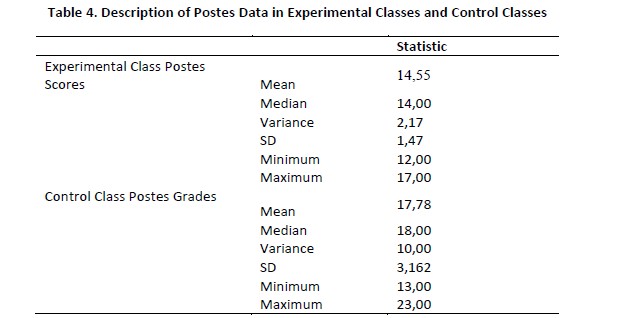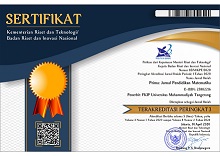
The Effect of Gamification Strategies on Mathematics Learning Outcomes Is Reviewed Based on Self-Efficacy
Abstract
Keywords
Full Text:
PDFReferences
Baduri, J., & Nurrahmah, A. (2024). The effect of self-efficacy on the mathematics learning outcomes of grade X high school students in West Jakarta. Derivative: Journal of Mathematics and Mathematics Education, 11(2), 147–156.https://doi.org/10.31316/jderivat.v10i2.6496
Bandura, A. (1997). Self-efficacy: The exercise of control. W.H. Freeman.
Bloom, B. S. (1956). Taxonomy of Educational Objectives, Handbook I: The Cognitive Domain. New York: David McKay Co. Inc.
Dina, F. N., 2020. The application of Game Based Learning using the Kahoot! As an interactive learning medium on acid-base material. Thesis. Semarang: Semarang State University. https://lib.unnes.ac.id/38975/1/4301415036.pdf
Hakim Lukman, et al. (2024). Analysis of Mathematics Learning Difficulties of Junior High School Students in Mathematics Learning. Journal of Learning and Scientific Studies, 8(1), 66-76.https://jurnal.untan.ac.id/index.php/jurnalkpk/article/view/78212
Indirwan, et al. (2021). The Importance of Self Efficacy on Mathematics Learning Achievement. Journal of Sublimation, 2(1), 61-70.https://ojs.uho.ac.id/index.php/sublimapsi/article/view/13055
K. R. Winatha and I. M. D. Setiawan, "The Effect of Game-Based Learning on Learning Motivation and Achievement," Sch. J. Educators. and Kebud., 2020.
Lestari, D., & Utami, N. (2023). The use of Kahoot to improve communication and social interaction in distance learning. Journal of Digital Education, 20(1), 33-40.https://ejournal.undiksha.ac.id/index.php/jpd/article/view/48212
Prasetyo, D., & Sari, R. (2021). Game-based learning as an innovative approach to mathematics learning. Journal of Educational Innovation, 10(1), 45-60. https://ejournal.upi.edu/index.php/jip/article/view/32729
Rahmawati, A., & Nugroho, S. (2022). The use of technology in increasing the effectiveness of mathematics learning through games. Journal of Education and Technology, 19(1), 22-30. https://journal.uny.ac.id/index.php/jpt/article/view/45678
Rini, S., & Pratama, I. (2023). The use of technology to increase the effectiveness of mathematics learning through gamification. Journal of Education and Technology, 17(2), 105-112. https://journal.uny.ac.id/index.php/jpt/article/view/45678
Schunk, D. H., & Pajares, F. (2002). The development of academic self-efficac y. In A. Wigfield & J. S. Eccles (Eds.), Development of achievement motivation, 16-31
Sholichah, I., Arif, M., & Hadi, S. (2022). The use of the Kahoot platform to increase student engagement in math learning. Journal of Educational Technology, 14(1), 1-10. https://journal.uny.ac.id/index.php/jtp/article/view/45678
Suryadi, D. (2021). Hubungan Self-Efficacy terhadap Peningkatan Motivasi Belajar dan Hasil Belajar Matematika Siswa di Sekolah. Andragogi. https://jurnalptiq.com/index.php/andragogi/article/view/220
Sutrisno, A., & Wijaya, H. (2022). The influence of technological developments on game-based learning. Journal of Educational Technology, 18(3), 45-53. https://repository.lppm.unila.ac.id/51768/1/6433-24730-1-PB.pdf
Sutrisno, S. (2020). The Effect of Active Learning on Mathematics Learning Outcomes of Junior High School Students. Journal of Mathematics Education, 5(3), 45-56. https://journal.uny.ac.id/index.php/jpm/article/view/45678
Wang, A. I., & Tahir, R. (2020). The effect of using Kahoot! for learning – A literature review. Computers & Education, 149, 103818. Yuliana, R., & Haris, A. (2022). The use of Kahoot in mathematics learning to increase student motivation and understanding. Journal of Educational Technology, 18(3), 78-85. https://journal.uny.ac.id/index.php/jtp/article/view/45678
Yusuf, M., & Ahmad, F. (2022). The influence of teaching methods on students' mathematics learning outcomes in junior high school. Journal of Mathematics Education, 8(2), 112-125. https://www.researchgate.net/publication/348299190
DOI: http://dx.doi.org/10.31000/prima.v9i1.13111
Article Metrics
Abstract - 1651 PDF - 852Refbacks
- There are currently no refbacks.
Prima: Jurnal Pendidikan Matematika
Program Studi Pendidikan Matematika
Fakultas Keguruan dan Ilmu Pendidikan
Universitas Muhammadiyah Tangerang
Jl. Perintis Kemerdekaan I/33, Cikokol
Kota Tangerang, Indonesia
e-mail: primajpm@gmail.com
Prima: Jurnal Pendidikan Matematika (p-ISSN: 2579-9827 | e-ISSN: 2580-2216) is licensed under a Creative Commons Attribution 4.0 International License.







